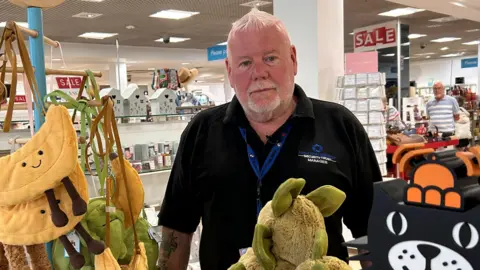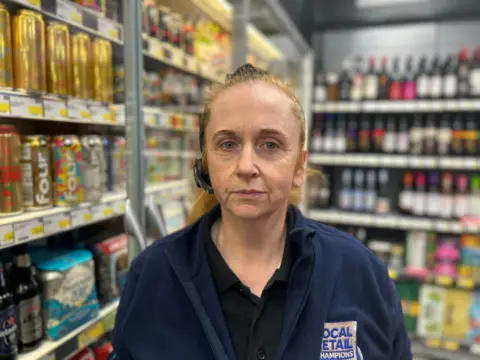Time taken to bring shoplifters to justice is ‘unacceptable’, retailers tell BBC
36 minutes agoCherry Wilson and Jim ConnollyBBC News Investigations

 BBC
BBCThe time it takes to bring shoplifters to justice is “unacceptable” with retailers waiting longer for criminals to face punishment compared with a decade ago, the BBC has learned.
In one case, stores targeted by a thief waited up to 10 months for a shoplifter to be sentenced, despite retail workers piecing together her identity without help from the police.
Chelsea Strange, 33, went on a three-week crime spree stealing £2,000 worth of Jellycat soft toys from four different stores across the south west of England and one in Wales – which she later sold on Vinted.
Figures obtained by the BBC show the average time it takes for a shoplifting case to be dealt with from offence to completion in a magistrates’ court in England and Wales has risen by more than 80% in the last 10 years – from 32 days in 2014 to 59 days in 2024.
Trade bodies representing retailers have said many stores have been left frustrated with the way shoplifters are dealt with. They say the time taken reduces shopkeepers’ faith in the justice system – making them feel there’s no point in reporting crimes.
“The delays in bringing perpetrators to court really does add insult to injury,” said Andrew Goodacre, chief executive of the British Independent Retailers Association.
“It is no surprise many small shop owners simply do not bother reporting the crime in the first place. In their minds it makes no difference.”
The BBC has looked at a series of shoplifting cases which highlight how shops have been left waiting months for thieves to be brought to justice.
We followed the Jellycat shoplifting case since December 2024, when we reported how a garden centre owner in Bridport, Dorset, had managed to piece together the thief’s identity by scouring resale websites, deciphering her car’s personalised number plate, and finding her Facebook profile.
Austins department store in Newton Abbot, Devon, was also targeted by Strange on three separate occasions – and staff said they too were able to figure out who she was.

 Austins Department Store
Austins Department StoreHead of security Tom Hirst described the time taken to deal with shoplifters as “unacceptable” and said the criminal justice system is “too easy on them”.
“You’re better off shoplifting than going to work, that’s my honest view,” he added.
“Every time someone comes in and steals something, that cost gets passed on… it puts the price up so we’re all paying.”
In July, Strange, from Felton, Bristol, was sentenced to a 12-month community order at Newton Abbot Magistrates Court after admitting stealing from five shops across Devon, Somerset, Dorset and South Wales in September and October last year.
She was also ordered to pay nearly £1,800 in compensation.
Strange’s defence team said the offences were out of character and would not have taken place if it had not been for her poor mental health.


Fiona Malone, who runs a Post Office in Tenby, Pembrokeshire, also told the BBC she had to wait five months for a shoplifter who stole from her store to face sentencing – despite catching the thief red-handed.
The shopkeeper confronted Natalie Lintern after security cameras captured her stealing pre-mixed vodka cans, sandwiches and cake from the store in August last year.
Mrs Malone chased the 36-year-old down the street and got the stolen items back before reporting it to the police.
“The whole criminal justice system is too slow, it’s bureaucratic,” she told the BBC.
“We need to deal with these people and deal with them quickly and think about alternative punishments to stop them doing it in the first place.”
In January, Lintern, from Pembroke, Pembrokeshire, was given a 12-month community order after pleading guilty to stealing from Tenby Post Office and four other stores between April and September 2024.
But the sentence did not stop her from shoplifting again.
Six months later, she was back in court again where she admitted stealing from a service station in May.
She was given six weeks in jail, suspended for 12 months.

 Tenby Stores and Post Office
Tenby Stores and Post Office“What we’re doing as a society, it’s not working,” said Mrs Malone.
“It’s like whatever punishment she got it was almost like ‘Oh never mind I’ll just go out and do it again’.”
The most serious shop thefts can end up being heard at crown court where figures show the average time from the offence to cases being completed has increased from 111 days in 2016 to 128 days in 2024.
Shoplifter Bianca Mirica appeared in crown court after stealing more than £105,000 worth of goods from high street chain Boots between December 2023 and May 2024.
The 20-year-old, from Tottenham, London, was part of a shoplifting gang and would clear shelves of cosmetics and perfumes while another member of her team acted as look-out, according to police.
It took 14 months from her last theft before she was sentenced to 32 months in a young offenders’ institution, after pleading guilty to 18 charges of theft.

 Met Police
Met PoliceShoplifting has increased by 13% in the last year with 529,994 shoplifting offences recorded by police in England and Wales up to June 2025, according to the Office for National Statistics (ONS).
However, the ONS said there are signs that increasing rates of shops thefts being reported are now slowing.
The crime adds an estimated £133 onto the cost of an average UK household’s shopping bill each year, according to the Centre for Retail Research.
The government told the BBC it understood the “devastating impact” of shop theft on retailers and it was clear many cases were taking too long to be resolved, adding: “Justice delayed is justice denied.”
It said it is backing the courts with record funding and considering recommendations for long term structural reform of the system.
The National Police Chiefs Council said it had strengthened its relationship with retailers and improved information sharing in the last two years – which had resulted in a number of offenders being brought to justice.
Assistant Chief Constable Alex Goss said it planned to bring together police, shops and the security industry to make best use of their resources and “turn the tide on the volume of offending blighting our communities”.